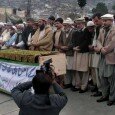By Haseeb Asif –
Who regulates the regulators?
During the fallout from the Geo TV Network/ISI fiasco, PEMRA came under intense scrutiny for its role as an independent and competent regulatory authority. On May 20 of this year, some members of PEMRA came out with statements saying that the broadcast licenses for Geo News, Geo Entertainment and Geo Tez had been suspended. Later, on the same day, PEMRA said in an official press release that the statement had no legal standing, as only 5 out of 12 PEMRA members had met and decided things among themselves.
Good that the confusion was cleared up then. Except, on June 6 PEMRA actually did suspend the license of Geo News for 15 days. No retraction followed this announcement and cable operators all over the country were asked to take down the broadcast of Geo News, which they had done already following pressure from right wing groups.
So after making official a ban on Geo’s transmissions that was already in place, PEMRA then proceeded to take a step back out of the limelight and things went along calmly for half a month. Geo waited out its suspension and hoped that PEMRA would encourage cable operators to officially resume transmission when the ban was lifted.
Geo had already apologized for its media trial of the ISI and things were close to a quiet, uneventful resolution. Maybe that’s why PEMRA then decided to suspend Geo Entertainment’s license for 30 days, ARY News’ license for 15 days, and slap them both with 10 million rupees fines, each.
Certainly, it doesn’t look like PEMRA members or staff have ever attended a conflict resolution workshop. Geo Entertainment’s punishment was for allegedly ‘insulting religious sentiments’ and ARY’s was for ‘bringing the courts into disrepute’, and also for repeatedly showing the malcontent that Geo Entertainment was being for, in what was just the latest attempt by ARY to undermine their broadcasting rivals (or superiors, depending on how you look at it).
Now, by all means, PEMRA has the rights to impose these bans and fines and regulate broadcasting content; it wouldn’t be a regulatory authority if it didn’t. But just because a judge has the ability to have someone thrown behind bars doesn’t mean they go around convicting people on the street.
There is due process, there are considerations, there is the obligation to uphold the constitutionally given rights of freedom of expression and freedom of press; but more than any of that, there is the requirement of consistency in the application of the rules.
Religious sentiments and integrity of the judiciary are indeed under the direct purview of PEMRA, but their rulebook also says that, “No programme shall be aired…that is likely to expose an individual or a group or class of individuals to hatred or contempt on the basis of race or caste, national, ethnic or linguistic origin, colour or religion or sect, sex, sexual orientation, age or mental or physical disability.”
Moreover, other clauses in the rulebook prohibit content that, “…promotes communal or sectarian attitudes or disharmony…contains anything defamatory or knowingly false…is likely to encourage and incite violence.”
It all begs the question, where is PEMRA when members of banned militant organizations are expressing sectarian and intolerant views? Or where is PEMRA when sexist, racist, classist, homophobic and ethnically derogatory views are being aired on television? Where is PEMRA when Mubasher Luqman is flinging unproven allegations left, right and center?
The Islamabad High Court finally felt the need to take notice about Luqman’s constant libel and defamation under the guise of journalism. The Supreme Court overturned the IHC’s order to ban Luqman from hosting his show, but that legal battle is being fought more on grounds of technicalities and jurisdiction.
The truth is that Luqman is exactly the type of media miscreant that should be under PEMRA’s notice, if PEMRA was anything more than a politicized puppet show. Why, exactly, is the organization so disorganized?
One answer may be forthcoming from the Federal Investigation Agency, which in March of this year registered cases against eight PEMRA officials over the illegal, nepotistic and paid recruitments of 316 employees, where positions were only available for 119.
PEMRA’s independence and competence is certainly not questioned for no reason.































































































